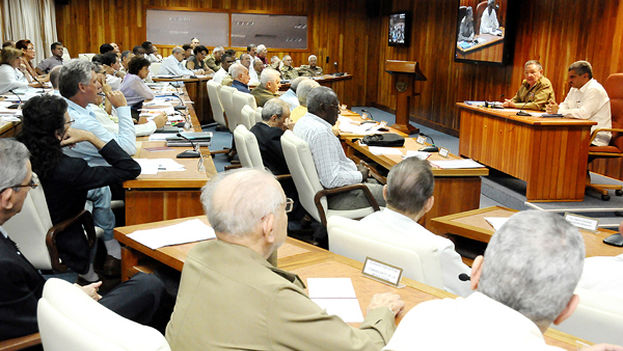
![]() 14ymedio, Havana, 30 June 2017 — The latest Council of Ministers, chaired by Raul Castro, has extended the term of the country’s land leases under the usufruct system to 20 years, but the leases can be cancelled if the beneficiaries use illicit funds, according to an announcement today in the official press.
14ymedio, Havana, 30 June 2017 — The latest Council of Ministers, chaired by Raul Castro, has extended the term of the country’s land leases under the usufruct system to 20 years, but the leases can be cancelled if the beneficiaries use illicit funds, according to an announcement today in the official press.
The meeting analyzed the economic performance of the first half of 2017 and included the announcement of new measures “to improve self-employment” and the decision to consolidate the experiment of non-agricultural cooperatives.
According to Ricardo Cabrisas Ruiz, Minister of Economy and Planning, the national economy behaved as planned. For the second semester, higher levels of execution are expected with “the arrival of imported supplies and the completion of contracts.”
Marino Murillo Jorge, head of the Permanent Commission for Implementation and Development, announced that it will no longer be for 10 years, but rather for 20, that a ‘natural person’ will be able to enjoy the use of the land in usufruct, although he pointed out that these lands remain “nontransferable property of the State and must be kept in operation.”
If the authorities detect that the person leasing the land has used illicit financing, it may cancel the usufruct agreement, a move that could be an answer to the recent announcements of Donald Trump’s administration to support local entrepreneurs to the detriment of state- or military-owned and operated businesses.
During the Council of Ministers it was also announced that to receive land, “natural persons have to work and manage it in a personal and direct manner.”
As of September 2016, 4.7 million acres of land had been delivered in usufruct, representing 31% of the country’s agricultural area. Starting now, the taxes provided in the Tax Law concerning the use, possession and idleness of the land, will gradually begin to be applied.
The lack of growth in the delivery of land is due, as Murillo explained, to the fact that the number of requests have declined, since the currently available land extensions “are less productive, with high infestation from the invasive marabou weed, are far from the population settlements and basic services, or have difficulty accessing water sources.”
The measures to “improve self-employment,” which were not explained to the press, will be aimed at increasing control over entrepreneurs.
There was no report of any decisions made about the longed-for wholesale market, the ability to import, or an increase in authorized occupations.
However, concerns were expressed about “the use of raw materials, materials and equipment of illicit origin” in the private sector, in addition to “breaches of tax obligations and underreporting of income,” among other irregularities.
The authorities acknowledged that the presence of more than half a million people in self-employment activities “confirms its validity as a source of employment, while increasing the supply of goods and services, with acceptable levels of quality.”
The update of the policy of non-agricultural cooperatives was limited to “concentrating efforts on consolidating the 429 already constituted.”
The government reproaches these types of entities for “deviations from the original idea for which they were created,” their tendency to increase prices, and the use of bank loans for “purposes other than the concepts for which they were granted.”
However, the Government recognized that this type of management structure, authorized three years ago, “constitutes an alternative that frees the State from the administration of economic activities, production and services that are not considered primary,” which will continue to be treated as “an experiment” going forward.
